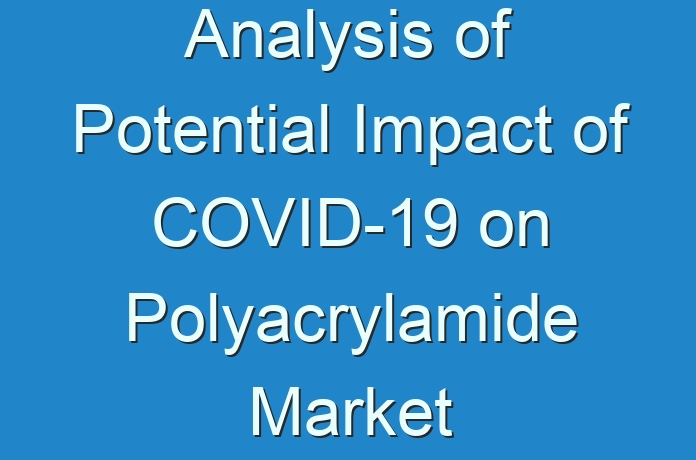
Key Highlights of Global Polyacrylamide Market
- The global Polyacrylamide market was valued at US$ 4,976.2 Mn in 2018 and is anticipated to expand at a CAGR of 6.2% during the forecast period
- Polyacrylamide are used for various applications based upon the type of product and form of polyacrylamide product available.
- Low price and high demand for anionic polyacrylamide in water treatment and food recycling applications is projected to boost the segment share across the globe. Non-ionic polyacrylamide is primarily used in the mining industry.
Request Brochure:
https://www.transparencymarketresearch.com/sample/sample.php?flag=B&rep_id=881
Key Drivers of Global Polyacrylamide Market
- A significant rise in the demand for energy has boosted the exploration, production, and recovery of oil and petroleum on a large scale.
- Asia Pacific is witnessing high demand for oil due to rising consumption in countries such as China, India, Japan, South Korea, and Indonesia. Increasing demand has put pressure on these countries to meet the high demand in the near future. This has led to a need to increase exploration activities in the region, which is expected to drive the polyacrylamide market during the forecast period.
- Polyacrylamide is extensively employed in the oil industry to enhance oil recovery and is prominently utilized as a drilling and fracturing fluid. The petroleum application segment is anticipated to expand due to the wide range of application of polyacrylamide.
More Trending Reports by TMR:
Expansion & Diversification can Provide Immense Growth Opportunities for Global Polyacrylamide Manufacturers
- Manufacturers of polyacrylamide strive to focus on widening their distribution channels to penetrate the market, considering the intense rivalry. Companies are expected to strengthen their sales force in China, India, ASEAN, and the U.S. due to the considerable expansion of the waste water treatment and oil & gas industries in these regions
- Manufacturers of polyacrylamide are focusing on expanding their production capacity to penetrate into new markets. Some companies have low market presence in regions that provide lucrative market opportunities. Such companies are focusing on expanding their footprint in these regions. Manufacturers also strive to develop technology and consolidate distribution channels in order to penetrate into new markets.
- Diversification can provide immense growth opportunities to manufacturers of polyacrylamides. Existing manufacturers can focus on the acquisition of smaller companies to integrate their operations. Backward integration can act as a major opportunity for market players. Integrated operations and technological developments to produce products are viewed as key factors for diversification. Low dependence on raw material suppliers provides integrated companies with an advantage over other players
Negative Health Issues Pertaining to Polyacrylamide to Hamper Global Market
- Environmental and health concerns related to polyacrylamide, when used for various applications, are the major factors hampering the polyacrylamide market. Polyacrylamide is a polymer of acrylamide. Acrylamide is a synthetic chemical which has been detected for causing neurological damage and cancer, when in contact. The product has been restricted in many countries especially for usage in food and food-related applications, due to its carcinogenic nature.
- Polyacrylamide, as a product, is a non-toxic material. However, liquid and powder forms of polyacrylamide have been known to cause irritation to the eyes and skin, when in contact.
- In the U.S., up to 500 ppm acrylamide in polyacrylamide preparations is acceptable for usage in agriculture or water treatment. In the U.K., a batch of polyacrylamide should not contain more than 0.025% of free acrylamide monomer, based on the active ingredient content.
- Exposure to polyacrylamide takes place through acquaintance to cooked foods and tobacco smoke. The negative health effects pertaining to this exposure is projected to be a major restraining factor for the global polyacrylamide market.
REQUEST FOR COVID19 IMPACT ANALYSIS:
https://www.transparencymarketresearch.com/sample/sample.php?flag=covid19&rep_id=881
Asia Pacific Dominates Global Polyacrylamide Market
- Asia Pacific is a prominent region of the global polyacrylamides market. It held a major share of the global market in 2018. The polyacrylamide market in Asia Pacific is anticipated to expand at a rapid pace during the forecast period due to the rise in population and awareness for waste water treatment in the region.
- Demand for polyacrylamide has been increasing in China and India, which is estimated to boost the market in the region. In addition, China is one of the major manufacturer and supplier of polyacrylamide across the globe since large number of local manufacturers are operating in the region.
- Rate of urbanization in China has soared from 36% to 53% from 2000 to 2012 and is anticipated surpass 60% by 2020. The polyacrylamide market in China is likely to be lucrative during the forecast period.
Fragmented Nature of Global Polyacrylamide Market
- The global polyacrylamide market is dominated by large-scale companies operating around the world. Key players such BASF SE, Kemira Oyj, SNF Group, and Bio-Rad Laboratories Inc. significantly dominate the market.
- SNF Group was a major player, holding majority of the share in the polyacrylamide market in 2018. The company’s success is primarily attributable to its R&D and innovation.
- BASF SE held a market share of more than 9% in 2018. The company has large number of products under the brand name Percol®. It is also planning to expand its polyacrylamide plant based in China.





